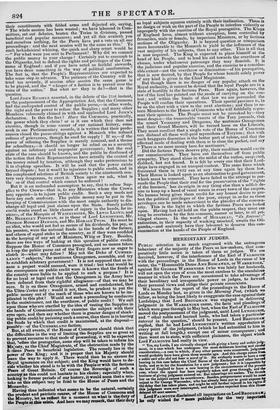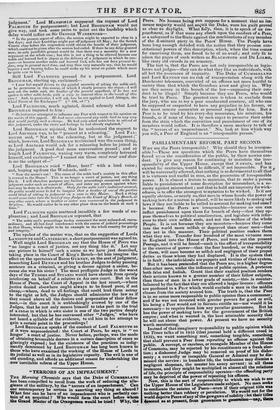judgment." Lord MANSFIELD supported the request of Lord . FALMOUTFI for
postponement; but Lord BROUGHAM would not give way, and took some pains to point out the hardship which delay would inflict on Sir GEORGE WARRENDER- " In the present aspect of affairs, the session might be expected to close in a -few days; and their Lordships might put off judgment till May; for the Scotch Courts close before the respondent could obtain the benefit of their judgment, • tchith could not he given after the session had ended. If there be any delay granted now, its only justifiable ground would be that there was a necessity for a new argument on the whole case ; but this is not a thing to be allowed because one noble and learned lord is absent at the delivery of a judgment in which he con- curs—or because another noble and learned lard, who has not been present be. fore, may be present next time, and may then very naturally say, that he would .requite a new hearing before he could make up his mind on points which must he quite haw to him."
Still Lord FALMOUTH pressed for a postponement. Lord BROUGHAM, starting up, exclaimed- " I now feel myself driven to the painful necessity of asking the noble earl, as he perseveres in this course, of which I clearly perceive the object—I will now ask the noble earl, the brother of the present appellant, if he has not spoken to other noble lords, with a view to interest them in the result of this case? And, in particular, I will ask, has be not applied to Lord Abinger, the Chief Baron of the Exchequer?" (" 0/i, oh !") Lord FALMOUTH, much agitated, denied solemnly what Lord BROUGHAM imputed to him : " Ile had never attempted to influence any Peer with respect to his opinion on the merits of this appeal. He had never canvassed any noble lord in any way that would *justify suck a charge. He bad only asked noble lords to attend at this judgment, under the views and feelings lie had already explained."
Lord BROUGHAM rejoined, that he understood the request to Lord ABI NGER was, to be " present at a rehearing." Lord FAL- MOUTH said, " Not at the rehearing, but at the judgment ;" which, however, Lord BROUGHAM maintained was the same thing, as Lord ABINGER would ask for a rehearing before lie joined in the judgment. A good deal more conversation passed ; and at length Lord FALMOUTH, waxing very warm, completely betrayed himself, and exclaimed—" I cannot see those most near and dear to me the subject of—" Lord BROUGHAM cried " Hear, hear!" with a loud voice ; and, leaping up from the Woolsack, said- " Now the secret's out ! The cause of the noble lord's anxiety in this affair is avowed to the House ! This is no longer a court of justice, nor any thing like it. I will therefore postpone any further proceedings connected with the judgment under such an aspect of affairs, and enter my protest against what- ever may be done in it afterwards. Only fin- the noble earl's indiscreet avowal, the public would never be led to imagine that a brother of one of the parties could think of sitting in judgment out a case in this House. Such a thing would never enter into the head of any Judge in the Court of King's Bench, or any other court, where a broth(r or sister was concerned in the judgment to be* given. Ile would lather be in any other place than on the bench at such a time."
Lord FALMOUTH again muttered inaudibly a few words of ex- planation; and Lord BROUGHAM repeated, that " The noble earl's proceedings to-day contained the most unheard-of, extra- ordinary, and all-hut-fatal interference with the course of judicial proceedings in that House, which ought to be an example to the whole country for purity and integrity."
The upshot of the matter was, that on the suggestion of Lords LANSDOWNE and CANTERBURY, a short postponement was agreed to.
Well might Lord BROUGHAM say that the House of Peers was "no longer a court of justice, nor any thing like it." Let any one picture to himself such a scene as we have just described, 'taking place in the Court of King's Bench—let him imagine the effect on the spectators of Baron GURNEY, on the seat of judgment, beseeching Lord DENMAN and his brother Judges to delay passing sentence on a criminal, or giving a decree against a suitor, be- cause she was his sister ! The most profligate Judge in the worst days of the TUDORS and STUARTS would have shrunk from openly inteferriwg on behalf of a relative in his own court. But in the House of Peers, the Court of Appeal in the last resort,—where justice denied elsewhere ought always to be found pure, if not cheap,—where, dead to all feelings that could lead them astray to the right or left, the Judges should administer the law as if they soared above all the desires and propensities of their fellow men,—in this court it is unblushingly avowed by one of the Judges, that he not only means himself to take part in the trial of a cause in which is own sister is one of the two parties deeply interested, but that he has canvassed other "Judges," who have not heard a syllable of the evidence, to aid him in his attempt to gain a certain point in the proceedings! L. ord BROUGHAM speaks of the conduct of Lord FALMOUTH as if it were unprecedented: the Court of Peers, he says, is " no longer" a court of justice. Never before, perhaps, was the mode of obtaining favourable decrees in a certain description of cases so glaringly exposed ; but the existence of the practices so indig- nantly denounced by Lord BROUGHAM has long been known to those who have examined the working of the House of Lords in its judicial as well as in its legislative capacity. The evil is one of • old standing, and affords an additional reason for undertaking the inevitable nevitable reform of the Upper House.



























 Previous page
Previous page